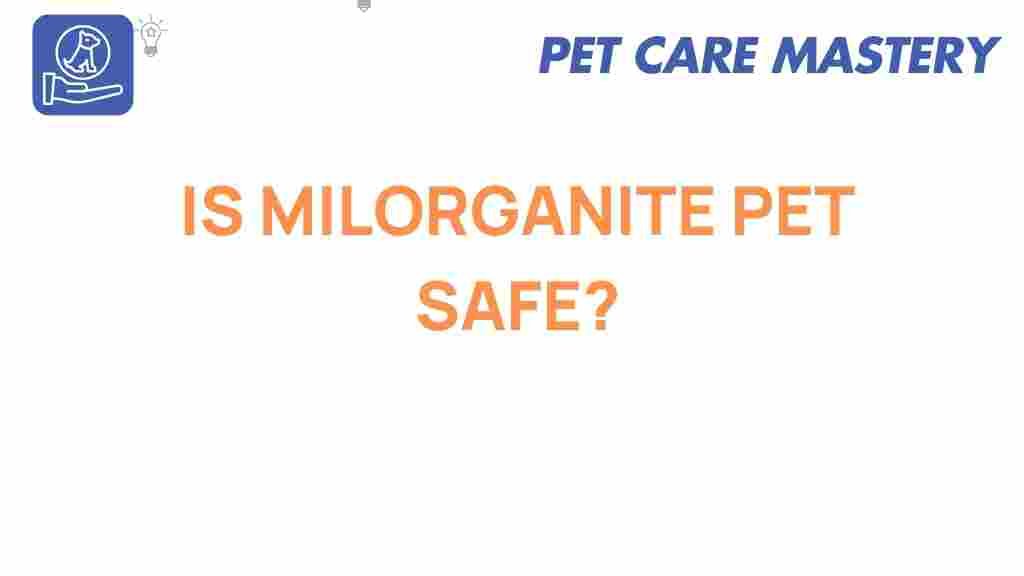Is Milorganite Pet Safe?
If you’re a pet owner, you likely want to ensure that your garden is a safe haven for your furry friends. One common question that arises is whether Milorganite, a popular organic fertilizer, is pet safe. In this article, we will delve into the facts and dispel any myths surrounding this fertilizer, helping you make informed decisions for your garden and your pets.
What is Milorganite?
Milorganite is an organic nitrogen fertilizer derived from treated municipal sewage. It is rich in nutrients and has gained popularity among gardeners for its ability to promote healthy plant growth. The product is made by the Milwaukee Metropolitan Sewerage District and is a sustainable option for enhancing soil quality. However, the concern about its safety, particularly for pets, has been a hot topic among pet owners and gardeners alike.
Understanding the Composition of Milorganite
To determine if Milorganite is pet safe, it’s essential to look at its composition:
- Nutrients: Milorganite contains nitrogen, phosphorus, and potassium, which are beneficial for plant growth.
- Organic Matter: Being a byproduct of treated sewage, it consists of organic materials that help improve soil structure.
- Pathogen Reduction: The treatment process used to create Milorganite involves high temperatures, effectively killing pathogens and weed seeds.
Is Milorganite Safe for Pets?
The primary concern for pet owners is whether Milorganite is harmful if ingested or if it poses any health risks to pets who might come into contact with treated areas. Here are some key points to consider:
- Non-Toxic Ingredients: Milorganite is non-toxic to pets. It does not contain harmful chemicals that could endanger your animals.
- Fertilizer Application: When applied according to the manufacturer’s instructions, Milorganite poses minimal risks to pets.
- Safe for Dogs and Cats: Many pet owners have used Milorganite without any adverse effects on their dogs and cats.
Precautions When Using Milorganite
While Milorganite is generally considered pet safe, taking certain precautions can ensure your pet’s continued safety:
- Application Timing: Apply Milorganite when pets are not in the garden, allowing time for it to settle into the soil.
- Watering: Water the area after application to help the fertilizer integrate into the soil and reduce the risk of ingestion.
- Observation: Monitor your pets after application to ensure they do not show any unusual behavior.
Signs of Ingestion or Allergic Reaction
Even though Milorganite is non-toxic, it’s essential to be observant. Here are some signs that your pet may have ingested fertilizer:
- Vomiting
- Diarrhea
- Lethargy
- Excessive drooling
If you notice any of these symptoms, consult your veterinarian immediately. It’s always better to be safe than sorry.
Step-by-Step Process to Use Milorganite Safely
Here’s a simple guide on how to use Milorganite in your garden while keeping your pets safe:
- Choose the Right Time: Opt for a day when your pets can stay indoors or away from the garden for several hours after application.
- Prepare Your Lawn or Garden: Mow your lawn and remove any debris to ensure even application.
- Apply Milorganite: Use a spreader to distribute the fertilizer evenly across the desired area, following the recommended rate on the package.
- Water Thoroughly: Water the area to help the fertilizer penetrate the soil and reduce the chance of pets coming into contact with it.
- Keep Pets Indoors: Keep your pets inside for at least 24 hours after application to allow the fertilizer to settle.
- Monitor Your Pets: After the waiting period, let your pets back outside and observe their behavior for any signs of distress.
Troubleshooting Common Concerns
Even with the best precautions, issues can arise. Here are some common concerns and solutions when using Milorganite:
Concern 1: My Dog Ate Milorganite
If your dog ingests Milorganite, keep calm. Since it is non-toxic, monitor them closely for any unusual behavior. If symptoms appear, contact your veterinarian.
Concern 2: My Cat Keeps Licking the Lawn
Cats are naturally curious, and they might be attracted to the smell of Milorganite. If you notice your cat licking the grass, redirect their attention to safe toys and ensure they are not in the area of application for a while.
Concern 3: My Pet Has Allergic Reactions
If you suspect your pet might have an allergic reaction, consult your veterinarian. Allergies can manifest in various ways, so it’s crucial to identify the trigger.
Benefits of Using Milorganite
Aside from being pet safe, there are numerous benefits to using Milorganite in your garden:
- Environmentally Friendly: Milorganite is a sustainable choice that recycles waste into a useful product.
- Improves Soil Health: It enhances soil structure and increases microbial activity, which is beneficial for plant growth.
- Slow-Release Nutrients: Milorganite provides a slow release of nutrients, ensuring your plants get a steady supply over time.
Conclusion
In summary, Milorganite is a pet-safe fertilizer that can benefit your garden without posing risks to your pets. By following proper application techniques and precautions, you can enjoy a vibrant garden while keeping your furry companions safe. If you want to learn more about organic gardening practices, consider visiting this informative resource.
For additional insights into maintaining a pet-friendly garden, check out our guide on gardening with pets. Happy gardening!
This article is in the category Nutrition and created by PetCareMastery Team
